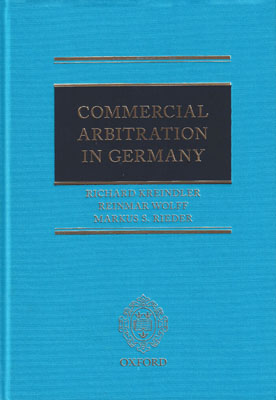
This is a much-needed reference work providing practitioners and academics with a detailed commentary on and thorough analysis of German arbitration law and practice. This title covers both domestic and international arbitration in all its stages.
The work details the legal framework for German-related arbitration and provides practical guidance on the appropriate choices, with a specific focus on particularities of German law and practice. It contains a high level of analysis whilst maintaining a practical approach and structure mirroring the typical course of arbitral proceedings.
The book navigates along the life cycle of an arbitration, commencing with the arbitration agreement, continuing with the arbitral tribunal, the arbitral proceedings and interim relief, and concluding with the arbitral award including its recognition and enforcement. At each stage, the work combines exhaustive legal analysis, clear and concise presentation, and a practical and accessible approach.
Written by highly regarded experts in the field, it provides arbitration practitioners and academics alike with a thorough guide for use when working on cases with a German nexus with a detailed analysis of the applicable legal framework in Germany.
Arbitration in Germany continues to grow as the country builds on its reputation as a suitable venue for international arbitration. This trend is reflected in the increasing relevance of the German Institution of Arbitration (DIS), which currently has more than 1,150 members domestically and overseas, including numerous major trade organizations and chambers of commerce, leading German companies, judges, lawyers and academics.
The number of arbitration cases under the DIS Rules has more than doubled since 2005 while statistics of the International Chamber of Commerce (ICC) show that Germany is the fifth most frequently chosen place of arbitration and German law is the fourth most frequently chosen law. Even where the place of arbitration is outside Germany, German arbitration law plays an increasingly important role for the recognition and enforcement of awards.
This particular significance is highlighted by Germany's strong export-oriented economy and is mirrored in the fact that German parties are the second most frequently encountered nationality among parties in ICC arbitrations worldwide.